- Home
- Henry James
First Frost
First Frost Read online
First Frost
A DS Jack Frost Investigation
JAMES HENRY
This eBook is copyright material and must not be copied, reproduced, transferred, distributed, leased, licensed or publicly performed or used in any way except as specifically permitted in writing by the publishers, as allowed under the terms and conditions under which it was purchased or as strictly permitted by applicable copyright law. Any unauthorised distribution or use of this text may be a direct infringement of the author’s and publisher’s rights and those responsible may be liable in law accordingly.
Version 1.0
Epub ISBN 9781409043096
www.randomhouse.co.uk
TRANSWORLD PUBLISHERS
61–63 Uxbridge Road, London W5 5SA
A Random House Group Company
www.rbooks.co.uk
First published in Great Britain
in 2011 by Bantam Press
an imprint of Transworld Publishers
Written for the Estate of R. D. Wingfield by James Gurbutt and Henry Sutton
Copyright © The Estate of R. D. Wingfield 2011
James Gurbutt and Henry Sutton have asserted their right under the Copyright, Designs and Patents Act 1988 to be identified as the authors of this work.
This book is a work of fiction and, except in the case of historical fact, any resemblance to actual persons, living or dead, is purely coincidental.
A CIP catalogue record for this book is available from the British Library.
ISBNs 9780593065341 (hb)
9780593065358 (tpb)
This book is sold subject to the condition that it shall not, by way of trade or otherwise, be lent, resold, hired out, or otherwise circulated without the publisher’s prior consent in any form of binding or cover other than that in which it is published and without a similar condition, including this condition, being imposed on the subsequent purchaser.
Addresses for Random House Group Ltd companies outside the UK can be found at: www.randomhouse.co.uk
The Random House Group Ltd Reg. No. 954009
2 4 6 8 10 9 7 5 3 1
Contents
A Note from Phil Wingfield
Map
Progolue
Saturday
Sunday (1)
Sunday (2)
Sunday (3)
Sunday (4)
Sunday (5)
Sunday (6)
Sunday (7)
Sunday (8)
Monday (1)
Monday (2)
Monday (3)
Monday (4)
Monday (5)
Monday (6)
Monday (7)
Tuesday (1)
Tuesday (2)
Tuesday (3)
Tuesday (4)
Tuesday (5)
Tuesday (6)
Tuesday (7)
Wednesday (1)
Wednesday (2)
Wednesday (3)
Wednesday (4)
Wednesday (5)
Wednesday (6)
Wednesday (7)
Wednesday (8)
Wednesday (9)
Wednesday (10)
Wednesday (11)
Thursday (1)
Thursday (2)
Thursday (3)
Thursday (4)
Thursday (5)
Thursday (6)
Thursday (7)
Thursday (8)
Thursday (9)
Thursday (10)
Thursday (11)
Friday (1)
Friday (2)
Friday (3)
Acknowledgements
About the Author
A Note from Phil Wingfield
As you can imagine, the embryo idea of a new Frost novel written by someone other than my father filled me with mixed emotions. What would friends, family and fans think? What would he have said? A great idea, a sensible move, betrayal? I knew that if we went ahead with the project it had to be right. When I read the book, I had to admit that James and Henry had done their homework and made a superb job of capturing my father’s style – no mean feat. I did feel a significant twinge of guilt thinking this, which only increased as I found myself immersed in the story.
Jack Frost’s route to fame is as full of twists and turns as the books themselves. He originally surfaced in the novel Frost at Christmas in 1972, which was rejected by the commissioning publisher. The novel was then transcribed for radio and Three Days of Frost was broadcast in 1977. My father’s agent, Jacqui Lyons of Marjacq Scripts, continued to promote the manuscript, and her efforts paid off in the early eighties when Frost at Christmas was published in Canada. UK publication finally came in 1989 and Jack Frost was home again. By 1992 the then three Frost novels had been transcribed for TV and the series A Touch of Frost made Jack a household name.
Over the years, Rodney continued to write for radio as he much preferred this medium. But as demand for radio lessened he turned back to the printed word. He always said that he found novel-writing an ever-increasing chore, but ironically his books turned out to be increasingly marvellous reads. He wrote a further three before his death in 2007.
So, in conclusion, I think it is a wonderful and fitting tribute to my father and his work that James and Henry are breathing new life into his creation and bringing back Jack Frost in this prequel. In my humble opinion, fans and newcomers alike will not be disappointed by First Frost.
Phil Wingfield
Prologue
He followed them up the escalator to the third floor – children’s clothes and lingerie. The woman was in no hurry. He was, but he knew he had to be careful. He’d spotted a security guard on the ground floor. Couldn’t see one on this floor, yet.
Saturday afternoon and the place was heaving – perfect. Perhaps he was in luck.
He thought there should have been a guard on every floor, big place like this. This was no way to run a department store, recession or not. If only things had been as slack when he was a player. Then he wouldn’t be in this mess. He’d be living the high life, a big happy family in tow. El Dorado. That’s how it should have been.
They were looking at school uniforms. Short, grey pleated skirts. Navy sweaters. Crisp white shirts, bearing the logo of St Mary’s College for Girls. So that was where his girl went.
He pretended to be browsing through the duffel coats, aware he was the only man on the floor. He played with a toggle, wondering what it would be like to fasten a child into such a garment, snug as a rug. To give her a kiss and a cuddle, hold her tight. He’d missed a lot. But it wasn’t too late. He was still young and fit. He’d made good use of the indoor facilities.
The girl had removed her own coat and was trying on a sweater, out on the shop floor, under the bright spotlights, in front of everyone. He couldn’t believe how tall she was, for her age. They grew up fast nowadays, all right.
Music was coming from somewhere. What a racket. When he was younger and into all that stuff at least they knew how to play proper instruments, and sing in tune. None of this electronic nonsense. Or boys dressing as girls. He was amazed at how so much had changed in little over a decade. Changed for the worst.
She had picked out a skirt and was holding it against her waist. Not out here, my angel, he thought. Surely her mother had to say something, get her into a changing room. This wasn’t right. Who knew who could be watching? He couldn’t stand it. He shuffled further behind the rack of coats, breathing heavily. His head was throbbing. It was all going wrong already.
About to blow his cover, a large, buxom, middle-aged woman, wearing the store’s colours (a black skirt and a pale-green blouse, which was at least two sizes too small for her) walked up to the mother and child. He couldn’t hear what was said but this woman – the floor manager? – pointed to a far corner.
The changing rooms.
He had been thinking everything was lost but now a new opportunity suddenly presented itself. The girl sloped off towards the changing rooms, clutching an armful of tiny skirts and tops, while the mother drifted across to the lingerie. That woman hasn’t changed, he thought. The tart.
He hung back for a couple of minutes; then, with his heart thumping wildly and his right hand clasping the still-damp handkerchief in his jacket pocket, he walked quickly across the floor, and slipped behind the partially drawn curtains leading to the cubicles.
Surprise was going to be his best weapon. Plus a bit of luck. It was about time things went his way: he’d already paid a heavy price.
Saturday
Detective Constable Sue Clarke sat on the edge of a soft, black leather armchair, across the living room from Mr and Mrs Hudson, who were slumped at either end of a matching settee. Mrs Wendy Hudson, a pretty, curvy fake blonde, in her late thirties, was clutching a tissue. Mr Steven Hudson, of a similar age, but with a slim, boyish build, and also with blond highlights in his hair, fashionably tufty on top and long at the sides, was drawing heavily on a Silk Cut.
It was eight o’clock at night. Pitch black and raining hard outside the neat, warm Hudson home.
DC Sue Clarke said, addressing Mrs Hudson, ‘I know this is hard for you but try to remember everything as clearly as possible. You never know what might be useful.’ Having just turned twenty-five, and recently promoted to CID, Clarke was anxious to play it by the book, and not make any mistakes in her questioning.
‘I’ll try,’ said Mrs Hudson, looking up. Her voice was tired and shaky.
‘Tell me about the last time you saw your daughter, Julie. This was in Aster’s, the department store, in the centre of Denton. Is that right?’
‘Yes,’ said Mrs Hudson weakly. ‘We were in the school-uniform bit, on the third floor – Julie needed a new skirt. She went to the changing room with an armful of stuff, and that was the last I saw of her.’ The woman choked back a sob.
‘You were waiting outside the changing room?’ asked Clarke, her notepad in hand.
‘Not exactly.’ Mrs Hudson was now keeping her eyes on the floor. She was wearing surprisingly high-heeled shoes, of a not dissimilar colour to the lurid orange-patterned carpet.
Clarke pressed on. ‘Where were you, then?’
‘I suppose I’d wandered over to another section – there’s this new lingerie bit.’ The woman coughed into her tissue. ‘But Julie’s a big girl, she’s very nearly thirteen. It’s not like she needs me watching over her at all times.’
‘No, of course not,’ said Clarke, noticing Mr Hudson flinch. ‘But how long was it before you realized she was missing?’
‘I don’t know. It couldn’t have been more than twenty minutes. I went to find her in the changing rooms, and she wasn’t there – nobody was.’
Mr Hudson was now staring at his wife, and not, Clarke thought, out of sympathy or concern. He was angry. ‘Twenty minutes?’ Clarke repeated, careful to not sound accusatory.
‘Julie always takes her time in front of a mirror,’ explained Mrs Hudson.
‘Like her mother,’ said Mr Hudson.
‘There was no attendant by the entrance to the changing rooms, I take it?’ said Clarke.
‘No, there weren’t many staff about at all.’
‘But the shop was busy?’
‘I’ve seen it busier.’
‘You would know,’ muttered Mr Hudson, standing up, stubbing his cigarette out in an ashtray on the glass-and-chrome coffee table, then sitting straight back down again. He was a short man, shorter than his wife. ‘The amount of time you spend in there, running up my account.’
‘Did you see anyone suspicious?’ asked DC Sue Clarke.
‘What do you mean?’ said Mrs Hudson, shifting uncomfortably on the settee.
Clarke’s eye was momentarily distracted by the enormous television in the corner of the room. Beside it were a new VCR machine and a stack of video cassettes. From where Clarke was she couldn’t read the titles. ‘Men,’ she prompted. ‘Men behaving oddly.’
‘You mean like perverts?’ Mrs Hudson gasped.
‘Do you think she could have been snatched?’ said Mr Hudson, getting to his feet again.
‘We have to keep an open mind,’ said Clarke. ‘But it would be very unusual.’
‘I didn’t see anything, anyone behaving like that,’ said Mrs Hudson quickly. ‘I’m sure I would have noticed.’
‘Most likely she’s gone off to meet a friend,’ suggested Clarke. ‘I’m sure she’ll come bursting through your front door any moment.’
‘What if she doesn’t?’ said Mr Hudson.
‘Well, first of all we need to contact all her friends – see if they know anything. I’ll need a list.’
‘She wouldn’t do that,’ said Mrs Hudson. ‘Just disappear like that.’
‘I wouldn’t be so sure,’ her husband disagreed. ‘She can be a right stubborn little cow at times.’
‘She can’t have run away,’ sobbed Mrs Hudson. ‘Why would she do that?’
Clarke looked at her, the tears now rolling down her cheeks, and then hard at Mr Hudson. He was giving her the creeps. ‘Is she generally happy?’ she asked. ‘Are things OK at home?’
‘She’s in a world of her own,’ said Mr Hudson, sitting down once more. ‘All she does is play records and get dressed up. Spends most of her time in her room.’
‘She’s a good girl,’ said his wife. ‘Headstrong at times, but who isn’t at that age?’
They all looked up to see Detective Constable Arthur Hanlon appear in the lounge doorway, red-faced and very out of breath. Though he was still in his thirties, Clarke had always thought her chubby colleague could easily pass for being two decades older; it wasn’t just his weight and thinning salt-and-pepper hair, but his old-fashioned moustache, and cheap, unfashionable clothes.
Hanlon had been searching the girl’s bedroom, and was holding a framed photograph in his large, podgy hand. ‘I take it this is Julie?’ He waved the picture around.
‘Yes,’ said Mrs Hudson quietly.
Clarke strained to see a photograph of a desperately slight girl in school uniform. She had hazel eyes, prominent cheekbones and a pointy nose. There was a streak of red in her shoulder-length, mousey hair. Clarke didn’t think she looked much like either of her parents.
‘Can we borrow this?’ Hanlon asked. ‘We’ll need to get some copies made.’ He turned the frame over in his hands.
‘Someone’s taken her, haven’t they?’ Mrs Hudson suddenly wailed.
‘I’m sure they haven’t,’ said Clarke, hoping to God they hadn’t – such a vulnerable, impressionable-looking girl – and rising to her feet, not knowing whether she should walk over and comfort the woman. Her husband wasn’t going to.
‘She’ll show up soon enough,’ Hanlon added cheerily. ‘I expect it’s all been a bit of a misunderstanding.’
‘Don’t bet on it,’ Mr Hudson said sharply, standing again also.
Sunday (1)
‘Whatever next?’ Desmond Thorley muttered, fumbling for the Harvey’s Bristol Cream. It didn’t feel like he’d been asleep for long. The bottle appeared to be empty so he slumped back on his bench.
However, the high-pitched shrieking, which had so rudely and painfully woken him, seemed to be getting worse. It sounded like a child. A young child. But not at this hour, in the middle of the woods, surely.
His mind was playing games again, yet he couldn’t just go back to sleep and he found himself sitting up again and peering out through a badly smudged and cracked window-pane. There was daylight, already, not that he could see much except tree trunks and branches and the sodden ground.
He gathered his mound of threadbare coats and moth-eaten blankets tighter around him. Winter was fast approaching. He looked over at the old wood-burning stove, knowing the chimney was blocked solid with tar, like his lungs, no doubt.
Scratching his head, he then not
iced, lying on the dirty wooden floor, his tin of tobacco – open and all but empty. Not even one shred of Old Holborn.
Just at that moment his old railway carriage was rocked by that blood-curdling noise again, worse than anything he’d ever encountered on stage or screen; his bit-part acting career, though in the distant past, was still a vivid memory.
It was no good, he knew he wasn’t going to get back to sleep. Clasping his tatty covers around him, he swung his legs off the hard bench and let his feet fall to the sticky ground. He was already wearing his boots, what was left of them. Slowly he made his way to the end of the carriage. Pushing open the rickety wooden door, he blinked in the soft light. The freezing early-morning air making his bloodshot eyes water.
The frantic, terrifying noise was coming from some way off, to the left of the end of his track, behind a wall of rhododendrons and a vast copper beech, its last few leaves still clinging on for dear life.
Feeling a mixture of outrage and apprehensive curiosity, Thorley stepped gingerly down from his carriage and on to the forest floor. This was his home, his kingdom. How dare they wake him in such a manner.
He was used to wind and rain battering Denton Woods, but it was strangely calm, which made the noise even more penetrating and unbearable. He heard a rustle coming from the bushes – he was certain of it. He walked to the end of his track, where it joined the main path, and while he was debating whether he should attempt to go straight through the middle of the rhododendron bushes, or take the less obstructed but longer route round, he heard short, heavy panting breaths behind him.
Quickly turning, and managing to lose his grip on his blankets and outer garments at the same time, he was faced with the vision of a tall, perfectly built young woman jogging towards him. She was wearing clothing so tight it left little to the imagination. Every bump and crevice was shockingly revealed. What was it with these female keep-fit types and their Lycra?
Yet it was wasted on him: women weren’t his thing.
The woman was clearly startled, though rapidly seemed to feel reassured. Desmond Thorley knew he couldn’t have appeared much of a threat.

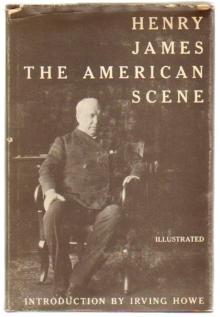 The American
The American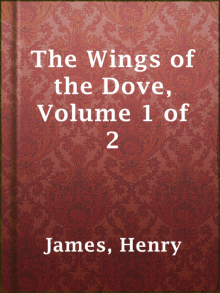 The Wings of the Dove, Volume 1 of 2
The Wings of the Dove, Volume 1 of 2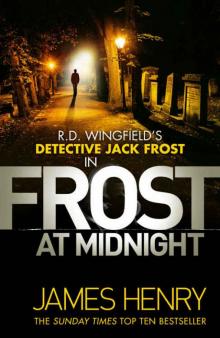 Frost at Midnight
Frost at Midnight Morning Frost
Morning Frost The Portrait of a Lady — Volume 1
The Portrait of a Lady — Volume 1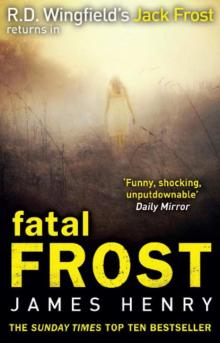 Fatal Frost
Fatal Frost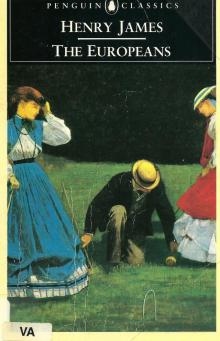 The Europeans
The Europeans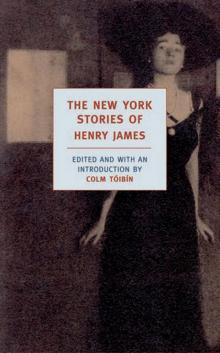 The New York Stories of Henry James
The New York Stories of Henry James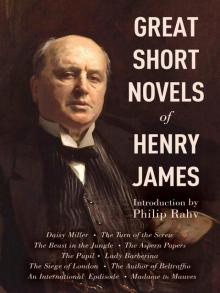 Great Short Novels of Henry James
Great Short Novels of Henry James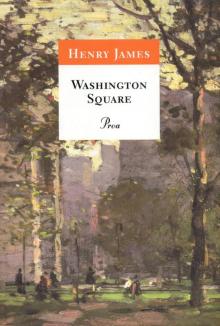 Washington Square
Washington Square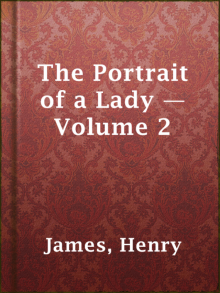 The Portrait of a Lady — Volume 2
The Portrait of a Lady — Volume 2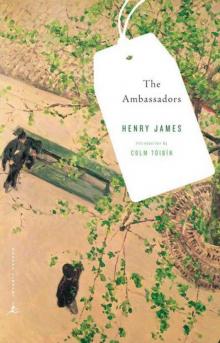 The Ambassadors
The Ambassadors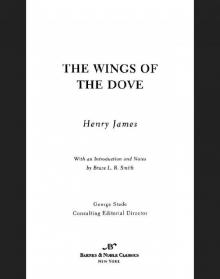 The Wings of the Dove
The Wings of the Dove The Princess Casamassima (Classics)
The Princess Casamassima (Classics)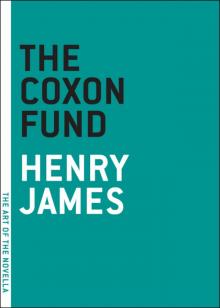 The Coxon Fund
The Coxon Fund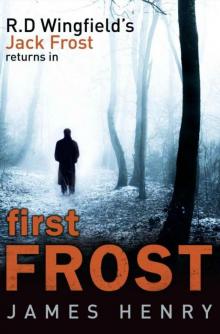 First Frost
First Frost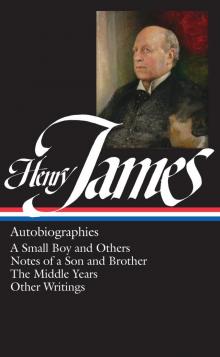 Henry James
Henry James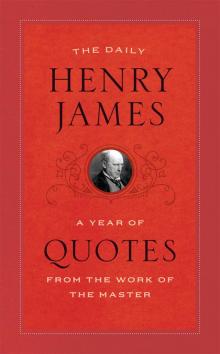 The Daily Henry James
The Daily Henry James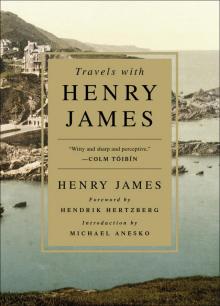 Travels With Henry James
Travels With Henry James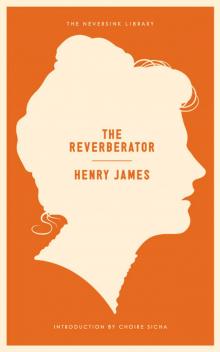 The Reverberator: A Novel
The Reverberator: A Novel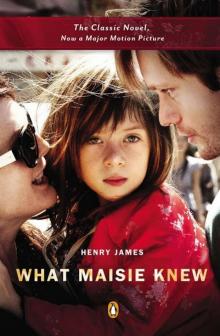 What Maisie Knew (Henry James Collection)
What Maisie Knew (Henry James Collection)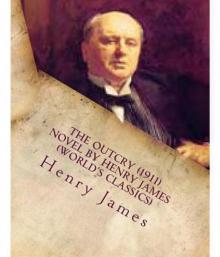 The Outcry
The Outcry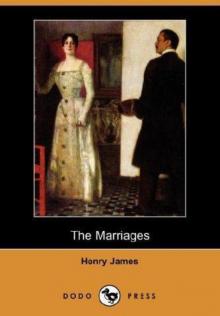 The Marriages
The Marriages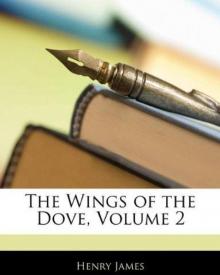 The Wings of the Dove, Volume 2
The Wings of the Dove, Volume 2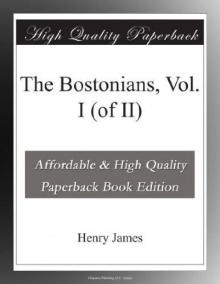 The Bostonians, Vol. I
The Bostonians, Vol. I The Outcry: -1911
The Outcry: -1911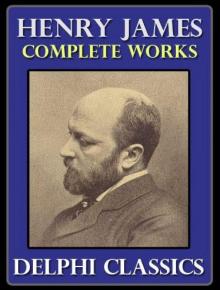 The Complete Works of Henry James
The Complete Works of Henry James Letters from the Palazzo Barbaro
Letters from the Palazzo Barbaro The Pupil
The Pupil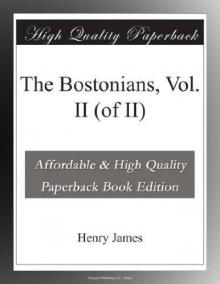 The Bostonians, Vol. II
The Bostonians, Vol. II Pandora
Pandora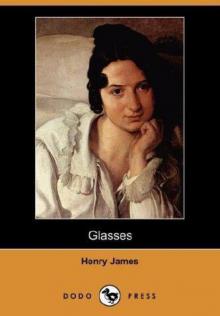 Glasses
Glasses The Princess Casamassima
The Princess Casamassima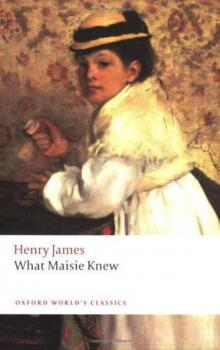 What Maisie Knew
What Maisie Knew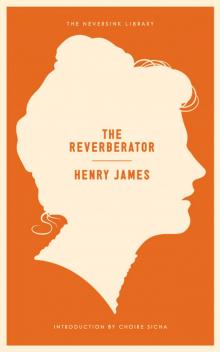 The Reverberator
The Reverberator The Golden Bowl - Complete
The Golden Bowl - Complete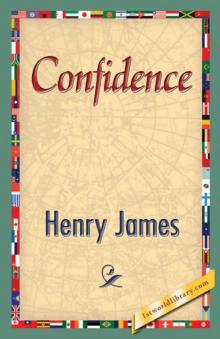 Confidence
Confidence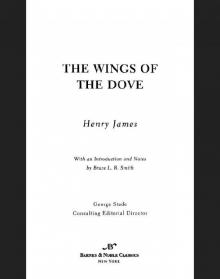 Wings of the Dove (Barnes & Noble Classics Series)
Wings of the Dove (Barnes & Noble Classics Series) The Spoils of Poynton
The Spoils of Poynton